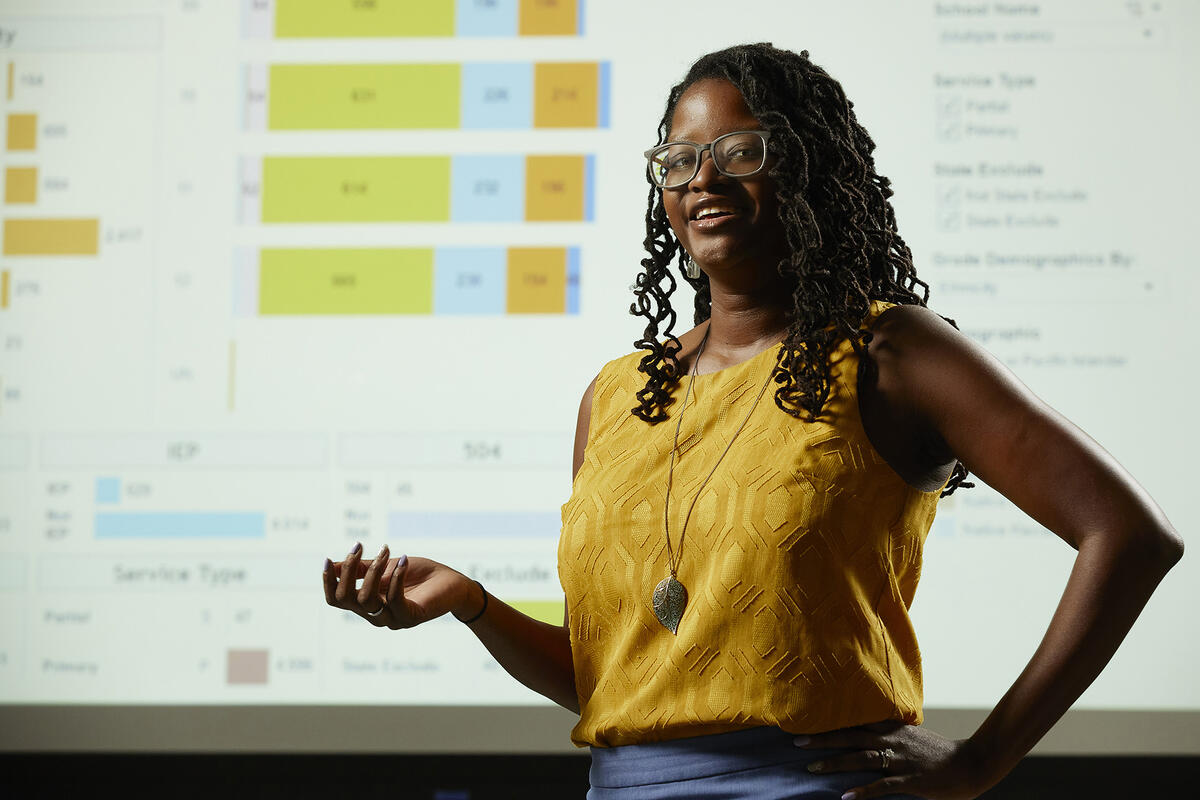Patrice Leverett was concerned about the increase in racialized incidents that have damaged community members' feelings of safety and security.
Determined to address these concerns, she set out to find a way to help, using her expertise and experience as a researcher.
“I wanted to improve the quality of education for students while also equipping teachers and school administrators with the skills and knowledge to address discipline in ways that acknowledge and mitigate bias,” said Leverett, an assistant professor in UNLV’s department of counselor education, school psychology, and human services.
The project she developed, conducted with the Clark County School District (CCSD) over the last three years, earned her the Office of Community Engagement 2021 Community-Based Research Award.
“This is the largest scale, school-based, implicit bias training study conducted to date,” Leverett said. “Our team ultimately plans to train all 4,000 teachers and administrators by 2022. Additionally, this project serves as a model for a replication study in partnership with Xavier University that will take place in New Orleans this fall.”
Leverett has worked with CCSD and UNLV’s Boyd School of Law to address issues of disproportionate discipline in CCSD schools.
Obvious problem
Early on, it became clear to her that there was a problem; African American students comprise approximately 15 percent of CCSD’s enrollment, but nearly 45 percent of suspensions and expulsions.
These numbers indicate there is a disconnect within school practices related to educational and behavioral outcomes for African American students — particularly males.
Leverett, along with her research partners, Kaitlin McCormick-Huhn, a social psychologist, and professor Sylvia Lazos, who practices constitutional law and advocates for education reform, sought to raise awareness of differential outcomes in school discipline practices, and to mitigate the effects of implicit bias in decision-making.
Ultimately, the goal was to reduce the number of behavioral referrals and loss of academic time for all learners, but particularly for overrepresented groups.
“The work we are doing to address long-standing concerns about racialized bias is much needed in this time of unrest,” Leverett said.
She was able to draw from her research on the development and adaptation of interventions that are culturally responsive to the needs of all learners to develop implicit bias training.
The goal of the training was to educate staff about national and local data pertaining to educational equity and to help staff understand how to address the issue of overrepresentation of these students in the data.
Some fine tuning
In 2018, CCSD participated in a pilot study with Leverett to fine-tune the training resulting in a collaborative project and point of pride for both CCSD and Leverett’s team. This training was provided to CCSD administrators, teachers, and school staff, and Leverett has now received approval from the CCSD Board of Trustees to expand the training opportunity to school mental health providers and student support specialists.
Last year, Leverett’s team also focused on training for school psychologists, counselors, and social workers so they could learn to utilize data to inform individual education plans.
This spring, she is working with student success specialists to increase their use of data to inform behavioral-focused outcomes through the existing framework of multi-tiered support.
Leverett’s project improves the quality of education for students while also equipping teachers and school administrators with the skills and knowledge to address discipline -- ultimately making a more cohesive community space for the school district and the community more broadly.
“This collaboration has not only strengthened community partnerships and relationships, it is also addressing the community issue of youth of color being disciplined more often and more harshly than their peers, leading to increased achievement gaps and decreased graduation rates,” said Tammy Malich, director of youth development and social innovation for the city of Las Vegas.
To assess the effectiveness of the training, Leverett used survey data to examine the growth in self-efficacy of administrators, teachers, and staff to identify and address implicit bias in school discipline. The participants in this study reported increased self-efficacy in addressing bias in schools and increased awareness of the role of bias in schools.
Additionally, the study showed that the more exposure to training participants had, the higher the expressed comfort with acting to mitigate bias when confronted in a school environment. This study also has been submitted for publication to the Journal of Mental Health in Schools and is currently under review.
Student opportunities
Leverett’s community-based research project has provided opportunities for UNLV students, too.
Several graduate students have gained experience by contributing to Leverett’s community-based research project; some have even changed the focus of their research to target intervention effectiveness in school environments.
One student has elected to join a separate research project with Leverett in which they interview training participants to gain a better understanding of the utility of the components in day-to-day practice.
“By drawing awareness to the differences in student outcomes and then equipping school personnel with tools to examine and address these gaps, we are targeting a community problem and even a national crisis,” said Leverett.
UNLV’s Office of Community Engagement established four university-wide awards in 2016 to recognize campus individuals for their exceptional community engagement in the areas of service-learning, community-based research, faculty/staff community outreach, and student service.



